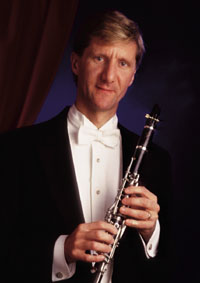This past Saturday and Monday I spent 7 hours recording a CD of 10 orchestral excerpts to be used as a preliminary round for a major US orchestra, the NY Philharmonic. The hours between were spent mostly practicing those excerpts.
Iíve said this before, and Iíll say it again. Playing in an orchestra is to skating in the Ice Capades what auditioning for an orchestral position is to winning the Olympics.
Olympic athletes donít have lives; they have only their goal, to win the Olympics. They sleep, eat, play, love and breathe that goal. Nothing else matters. Nothing else can matter, for every electron of their being must be pointed in one direction consistently for years in order to achieve that goal. Or attempt to achieve it. Many do not even gain a medal.
I hired a professional technician to help me with the task of recording and then editing the CD. Iím glad I did. After 7 hours of recording, there were 2 hours of takes from which the best 10 had to be selected to comprise the final 15 minute CD. This guy was top notch. He took detailed notes of my random playing order for each excerpt. (I often gave up perfecting one and tried another, or several others, before returning to the first.)
To be able to play those 10 excerpts with the highest quality, I had tested 50 or 60 reeds and rejected most of them (at $2 a shot) to get one or two which would let my music making shine through. I had practiced those excerpts with numerous reeds, and each reed had to be played slightly differently to make it work. Each excerpt also tended to demand a different kind of reed. Now I sought the one reed to rule them all!
Recording those 10 excerpts is like performing a decathlon, the height of athletic performance for any human. One has to be nimble to play Mendelssohnís sprightly Scherzo, powerful to lift the heavy drama of Verdiís Tosca or Kodalyís Dances of Galanta, rich and somber for the opening of Tchaikovskyís 5th Symphony, sensual and luring for Ravelís Bolero, and some of all of the above for Brahms 3rd symphony.
I also had to play parts one of the most deceptively difficult of concertos; Mozartís. Mozart demands both the purity of expression of a child and the technical mastery of a great artist.
I recorded right up to the deadline, allowing several hours for my engineer to edit the CD. With the finished product in my hands, I dared not listen to it, fearing only the flaws would reach my ears, nothing else.
I reread the very specific directions for sending it, which said to clearly label the jacket with my name. I took out an indelible marker and wrote my name on the CD, instead of the jacket. Since this was to be a ďblindĒ preliminary audition, they couldnít see my name on the CD. I had to copy the CD to a fresh disk and follow the directions this time, labeling the outside. Not a big deal, but time was running out.
It was now 8:15 PM. It had to be sent 9 PM to have it in the NY Phil office by the next morning. To be sure it copied correctly, I put the CD in my stereo and listened to a bit of each track. My heart sank. In the first 16 bars of the Mozart Concert, I noticed a few slightly out of tune notes.
Musicians are both blessed and cursed with astoundingly powerful and uncompromisingly sharp self-criticism. Those few out of tune notes would be nothing in a live performance, nothing at all. They would be of little consequence in a recording with orchestra, when the listener is taking in the big picture and the shape of the phrase. But when there are hundreds of applicants vying for one of only a few hundred jobs in the country, those first 16 bars are CRITICAL.
I pushed aside the gloomy mood which encroached. I was exhausted, having barely eaten the past two days, surviving on nervous energy. I headed for FedEx Kinkos to send it off. I flipped on the radio, which was playing a recording of Straussí Till Eulenspiegelís Merry Pranks. The music came to the part where Till is about to be executed, as the whole brass section plays the doomsday march to the scaffold. It was appropriate music for my current mood.
Till, played by the Eb clarinet in this section, screams out in fear and desperation at impending death. After squealing out an incredibly high note, the parts calls for a low one. In this performance, that low note was flat as all get out! I bellowed with frustrated laughter. Ah, the painful irony of it all.
After mailing off the tainted CD, I returned home to focus on finding the cause of the deathly smell which had permeated my house. After sniffing around a bit, I located the little corpse of a chipmunk under my piano, the room in which I had been recording. (undoubtedly brought in by my cats several days earlier) Another ominously ironic sign? Death inspired music making? No wonder it was out of tune!!
I decided I had to get out of the house. I phoned a friend to meet me at a restaurant for a bite to eat, my first real meal in two days. On the way I turned on the radio again. I immediately recognized the music which had pulsed through my veins since age 12; Mozartís Clarinet Concerto.
I also noticed several out of tune notes.




